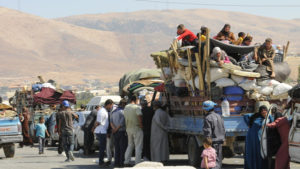Poorest nations bearing the biggest refugee burden
In 2016, 10,901 people sought asylum in Japan but only 28 were accepted. The previous year that figure was just 27.
Meanwhile, Germany, France and Sweden are stepping up the expulsion of so called ‘failed’ asylum seekers.
Without a cogent relocation plan, the EU has resorted to dumping refugees over the border in Turkey, where an increasingly authoritarian government is getting paid to warehouse desperate and vulnerable people.
 European Union ministers remain gridlocked over plans to distribute around 120,000 asylum seekers among member states by controversially allotting migrants according to countries’ economic and social capacities but conservative politicians are resisting the concept.
European Union ministers remain gridlocked over plans to distribute around 120,000 asylum seekers among member states by controversially allotting migrants according to countries’ economic and social capacities but conservative politicians are resisting the concept.
Hungary’s Prime Minister Viktor Orban is talking of amending his nation’s constitution to preempt EU migration mandates, with the aim of “preserving our country’s identity.”
And Britain this week stopped accepting unaccompanied child refugees.
Then, there’s Donald Trump and his promise to wind back the US’ long standing policy of accepting refugees. Trump has particularly targeted refugees from Muslim countries and tried to invoke travel bans on them.
Increasingly across the globe, wealthy nations are eschewing their responsibilities to accept refugees while poorer nations are being left to shoulder the burden.
The vast majority of refugees continue to be hosted by developing countries, particularly those that are proximate to the refugees’ countries of origin.
For instance, the bulk of the Syrian refugee population is hosted by Turkey (2.2 million), Lebanon (1.2 million) and Jordan (almost 630,000), according to figures recorded in December 2015.
And most forced displacement globally still occurs within countries’ borders, with an estimated 38 million people internally displaced by conflict and violence at the end of 2014 – from Iraq to South Sudan, from Syria to the Democratic Republic of Congo and Nigeria.
The year 2016 was also the deadliest year for migrants: increased levels of forced displacement globally were tragically accompanied by record-high numbers of people perishing or going missing while trying to cross international borders.
More than 5,400 migrants worldwide are estimated to have died or gone missing in 2016. According to International Organisation for Migration’s (IOM) Missing Migrant project, migrant fatalities during migration to Europe increased by 15 per cent compared to the previous year, reaching at least 3,770.
Human rights agencies say relatively wealthy societies can afford to provide resettlement assistance to more refugees.
According to Amnesty International’s European Institutions Office Iverna McGowan while the focus has been on enforcing borders, the humanitarian effort has lagged behind.
“European and other wealthy countries should not shirk from their responsibilities. This attempt to build up the walls of fortress Europe and try to outsource Europe’s obligations, ignores international human rights law carefully laid down to protect people in danger,” Ms McGowan said.
“The militarisation of borders does nothing to deter people from trying to reach safety in Europe, it only makes the journey more dangerous,” she said.












